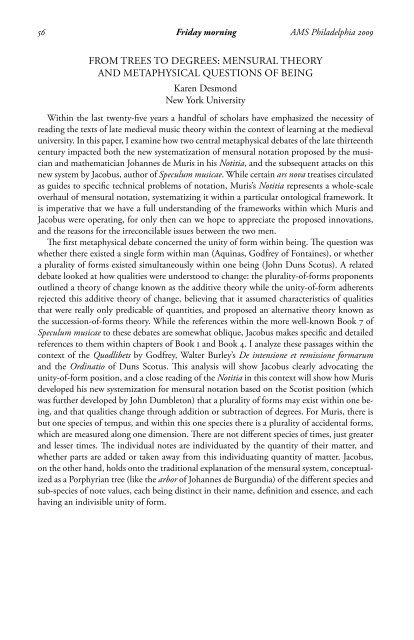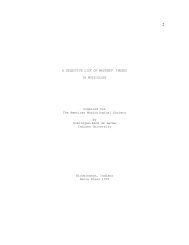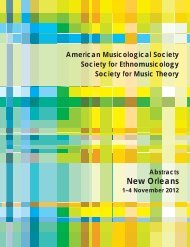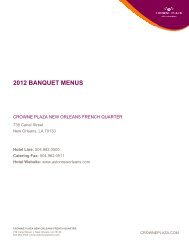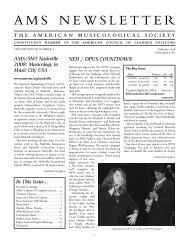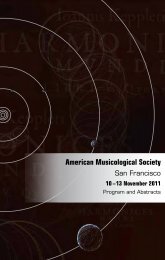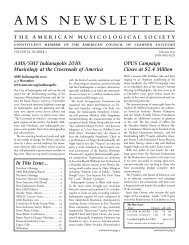AMS Philadelphia 2009 Abstracts - American Musicological Society
AMS Philadelphia 2009 Abstracts - American Musicological Society
AMS Philadelphia 2009 Abstracts - American Musicological Society
You also want an ePaper? Increase the reach of your titles
YUMPU automatically turns print PDFs into web optimized ePapers that Google loves.
56 Friday morning <strong>AMS</strong> <strong>Philadelphia</strong> <strong>2009</strong><br />
FROM TREES TO DEGREES: MENSURAL THEORY<br />
AND METAPHYSICAL QUESTIONS OF BEING<br />
Karen Desmond<br />
New York University<br />
Within the last twenty-five years a handful of scholars have emphasized the necessity of<br />
reading the texts of late medieval music theory within the context of learning at the medieval<br />
university. In this paper, I examine how two central metaphysical debates of the late thirteenth<br />
century impacted both the new systematization of mensural notation proposed by the musician<br />
and mathematician Johannes de Muris in his Notitia, and the subsequent attacks on this<br />
new system by Jacobus, author of Speculum musicae. While certain ars nova treatises circulated<br />
as guides to specific technical problems of notation, Muris’s Notitia represents a whole-scale<br />
overhaul of mensural notation, systematizing it within a particular ontological framework. It<br />
is imperative that we have a full understanding of the frameworks within which Muris and<br />
Jacobus were operating, for only then can we hope to appreciate the proposed innovations,<br />
and the reasons for the irreconcilable issues between the two men.<br />
The first metaphysical debate concerned the unity of form within being. The question was<br />
whether there existed a single form within man (Aquinas, Godfrey of Fontaines), or whether<br />
a plurality of forms existed simultaneously within one being (John Duns Scotus). A related<br />
debate looked at how qualities were understood to change: the plurality-of-forms proponents<br />
outlined a theory of change known as the additive theory while the unity-of-form adherents<br />
rejected this additive theory of change, believing that it assumed characteristics of qualities<br />
that were really only predicable of quantities, and proposed an alternative theory known as<br />
the succession-of-forms theory. While the references within the more well-known Book 7 of<br />
Speculum musicae to these debates are somewhat oblique, Jacobus makes specific and detailed<br />
references to them within chapters of Book 1 and Book 4. I analyze these passages within the<br />
context of the quodlibets by Godfrey, Walter Burley’s de intensione et remissione formarum<br />
and the ordinatio of Duns Scotus. This analysis will show Jacobus clearly advocating the<br />
unity-of-form position, and a close reading of the Notitia in this context will show how Muris<br />
developed his new systemization for mensural notation based on the Scotist position (which<br />
was further developed by John Dumbleton) that a plurality of forms may exist within one being,<br />
and that qualities change through addition or subtraction of degrees. For Muris, there is<br />
but one species of tempus, and within this one species there is a plurality of accidental forms,<br />
which are measured along one dimension. There are not different species of times, just greater<br />
and lesser times. The individual notes are individuated by the quantity of their matter, and<br />
whether parts are added or taken away from this individuating quantity of matter. Jacobus,<br />
on the other hand, holds onto the traditional explanation of the mensural system, conceptualized<br />
as a Porphyrian tree (like the arbor of Johannes de Burgundia) of the different species and<br />
sub-species of note values, each being distinct in their name, definition and essence, and each<br />
having an indivisible unity of form.


